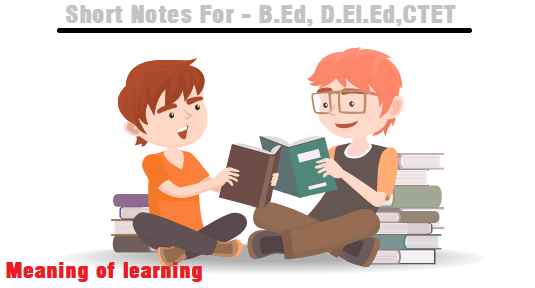A . Meaning of learning
Definition: learning is defined as a process of modification of reactions resulting from experience or practice. It is also defined as the acquisition of behavior patterns. It is the modification and Co-relation of the responses of the organism. Guilford defines learning ” as any change in behavior resulting from behaviour “. Learning is a process of being modified by past experience and practice. Learning is essentially an active process. Learning requires practice. It is enrichment of experience.
B . Characteristics of learning.
All learning involves activity and the activity that leads to learning may be physical or mental :
1) Motor learning : Learning that depends largely on motor and physical activities and leads to acquisition of skills is called motor learning.
This learning starts in the infancy making simple responses for mastering motor skills.
For example: walking, running, jumping etc.
2) verbal and conceptual learning :
Learning that depends almost fully on sensation, perception memory and thinking leads to the acquisition of knowledge and understanding and this learning is called verbal learning.
For example : learning to do simple arithmetic and answering simple questions.
3. Incidental learning:
Sometimes we learn although we did not make any clear-cut response to the situation or consciously attended to it. Such learning is called incidental learning.
For example: learning names of shops on the way to school
4. Deliberate learning:
We discriminate and select what we want to learn and then we make an effort to learn and acquire it. This is called incidental or deliberate learning.
For example: learning to play the piano or ride a bicycle
5. Problem-solving:
This is another form of learning which involves acquiring information above ourselves or the world, and learning how to solve problems in different situations.
6. Attitudinal learning:
This involves learning about the likes and dislikes for our day to day living.
For example: a child may love sports but hate watching a film.
C. FACTORS IN EFFECTIVE LEARNING.
1. Curiosity to know arising out of a sense of need is principle factor of learning.
2. Mere need is not enough. Will or readiness to satisfy is also necessary otherwise the curiosity to know falls short of fulfillment.
3. From the need of knowledge arises observation or exploration.
4. Fruitful observation involves attention.
5. Act of learning must be repeated with observation.
6. Repetition should be strengthened by a motive.
7. Knowledge of result- if they are told from time to time about their progress they are making, then they do better.
8. Interest and success strengthen the practice of learning.
9. Reward and punishment are the reinforcing factors of learning.
10. Maturation and Interest: a mature person learns sooner and also those who have strong interest learn better.
11. Methods of learning: for studying different subjects and learning different types of skills or for assimilating different materials, facts and thoughts, we have to adopt different learning methods
Mock Test
महत्वपूर्ण लेख जरूर पढ़ें:
- राष्ट्रीय शिक्षा नीति 1986 के अनुसार शिक्षा के उद्देश्य एवं लक्ष्य क्या है?
- भारतीय शिक्षा पर गांधीवादी दर्शन का प्रभाव तथा महात्मा गांधी की बुनियादी शिक्षा पर क्या विचारधारा थी ।
- टोली शिक्षा टीम टीचिंग किसे कहते हैं?
यह भी पढ़ें
- बुद्धि निर्माण एवं बहुआयामी बुद्धि और शिक्षा Multi-Dimensional Intelligence
- शैक्षिक तकनीकी की अवधारणा Concept of Education Technology
- शिक्षा के क्षेत्र में शिषण (Teaching) तथा अधिगम
- शैक्षिक तकनीकी की अवधारणा Concept of Education Technology
- शिक्षा के क्षेत्र में शिषण (Teaching) तथा अधिगम
- वृद्धि और विकास के सिद्धांतों का शैक्षिक महत्त्व
- विकास के सिद्धांत (Principles of Development )
- विकास की अवधारणा और इसका अधिगम से सम्बन्ध-Concept of development
- संवेगात्मक विकास अर्थ एवं परिभाषा- (Emotional Development)
- समावेशी शिक्षा ( Inclusive Education )
- कोह्लबर्ग का नैतिक विकास का सिद्धांत (Moral Development Theory of Kohlberg)
- मानसिक विकास का अर्थ तथा शैक्षिक उपयोगिता Meaning of mental Development and Educational
- पियाजे का संज्ञानात्मक विकास सिद्धांत ( Piaget’s Cognitive Development Theory )
- निरीक्षण विधि (Observation Method)
- गामक या क्रियात्मक विकास (Motor Development)
- दर्शनशास्त्र की परिभाषा -Philosophy Definition
- समाजीकरण में परिवार का योगदान Socialization in family
- समाजीकरण की प्रक्रिया-परिभाषा Socialization Processes
- वंशानुक्रम और वातावरण Heredity and Environment
- Spearman’s Two Factor Theory – स्पीयरमेन का द्विकारक सिद्धांत

